If you’re a therapist with a private practice, chances are you’ve been told you need SEO to reach more clients. But what does that really mean—and where should you start? The answer is keyword research. This foundational step helps you understand how potential clients are searching for services like yours and ensures your website is optimized to meet their needs.
Keyword research is especially critical for therapists because clients often look for highly specific services within a specific geographic area. When done correctly, keyword research can help your website show up in search results for queries like “trauma therapist in Chicago” or “child counseling near me.”
This guide will walk you through how to perform keyword research as a therapist, how to identify and use local keywords, and how to implement them into your website content in a way that’s both strategic and ethical.
1. Understanding the Basics of Keywords and Search Intent
What Are Keywords? Keywords are the phrases people type into search engines to find information. For therapists, these often include service-based terms like “grief counseling,” paired with location-based modifiers like “in Atlanta.”
Search Intent Understanding the intent behind a search is crucial:
- Informational: “What is CBT therapy?”
- Navigational: “BetterHelp login”
- Transactional/Service-Based: “anxiety therapist near me”
The more your content aligns with the user’s intent, the more likely it is to attract and convert the right audience.
2. Identifying Your Ideal Client and Their Search Language
Before diving into tools, step back and consider: Who are you trying to reach?
Are you working with:
- Teens experiencing social anxiety?
- Parents of children with ADHD?
- LGBTQ+ couples seeking relationship counseling?
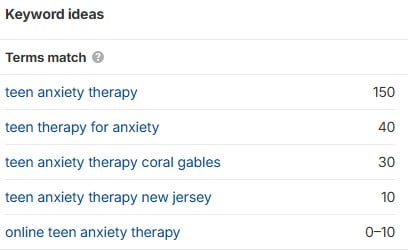
Each demographic uses different language in searches. For example:
- “Teen anxiety therapist in Austin”
- “ADHD child therapist near me”
- “LGBTQ couples therapy Los Angeles”
Creating simple client personas will help you select keywords that match what your target clients are actually typing into Google.
Leave Keyword Research to the Pros
Our team has decades of experience finding the right terms and helping our clients grow their business. Let our team show you the way.
3. Tools and Techniques to Find Local Keywords
Once you know your audience, it’s time to find the right terms they’re using. Here are a few reliable tools that you can access for little to no cost:
Google Keyword Planner
- Use it to get search volume and suggested terms.
- Apply location filters to find what people are searching for in your city.


Google Trends
- Compare terms over time to see what’s gaining popularity.
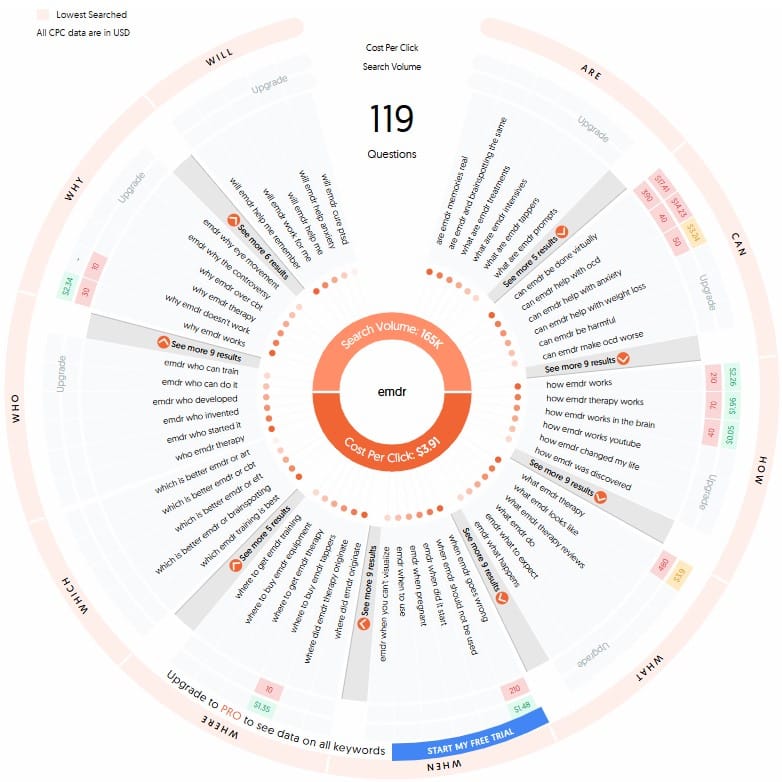
Answer the Public
- Get question-based queries like “how to find EMDR therapist near me.”
Ubersuggest
- Offers keyword difficulty and SEO difficulty ratings.
Review Your Competitors
- Look at other therapists’ websites in your area. Check their page titles, blog posts, and headers to see what terms they target.
| Tool | Best For | Action Tip |
| Google Keyword Planner | Search volume & local modifiers | Use “near me” or city names in queries |
| Answer the Public | Client questions | Turn common questions into blog titles |
| Google Trends | Tracking changes over time | Compare terms like “teletherapy vs. online therapy” |
Professional Strength Keyword Research Tools
Depending on how aggressively you want to pursue SEO, you may also want to look into the types of tools used by agencies like ourselves. These do come at a cost, however, but typically these providers offer a suite of services for SEO above and beyond simple keyword research. So it might be worth exploring these options for a variety of potential marketing tactics for your practice.
1. Ahrefs
- Best Used For: Comprehensive keyword research, competitor analysis, SERP overview, keyword difficulty, and traffic potential.
- Strengths:
- Large keyword database
- Organic and paid keyword data
- Powerful “Content Gap” and “Keyword Explorer” tools
2. SEMrush
- Best Used For: SEO and PPC keyword strategy, competitor benchmarking, and market insights.
- Strengths:
- Domain vs. domain comparisons
- Keyword Magic Tool for broad/niche terms
- Ad campaign keyword data (Google Ads)
3. Moz Keyword Explorer
- Best Used For: Keyword opportunity scoring and intent-based research.
- Strengths:
- Unique “Priority” metric combining volume, difficulty, and click-through potential
- SERP analysis with organic CTR insights
- Intuitive interface for beginners and pros
4. Using Long-Tail Keywords to Attract High-Intent Clients
Long-tail keywords are longer and more specific search terms. They usually have lower competition and higher conversion potential.
Examples:
- “Online CBT therapist in Nashville”
- “Mindfulness therapy for workplace stress San Diego”
- “Trauma counseling for veterans in Houston”
Why they work:
- They reflect clearer intent.
- Users are often further along in the decision-making process.
Add them to service pages and blog content, naturally and with user-first readability in mind.
5. Incorporating Keywords into Your Website Strategically
Knowing your keywords is one thing. Placing them properly is another.
Service Pages Include city + service in your page title, URL, H1, and throughout the body content.
Blog Posts Use long-tail keywords and common questions as titles.
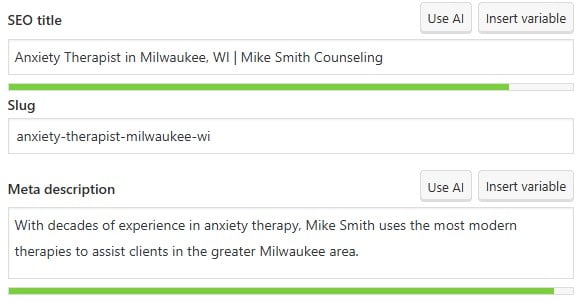
Metadata
- Title Tag: 60 characters max, include location + service
- Example: “Anxiety Therapy in Austin | Thrive Counseling”
- Meta Description: Entice the user to click
- Example: “Looking for compassionate anxiety counseling in Austin? Learn how Thrive Counseling can help.”
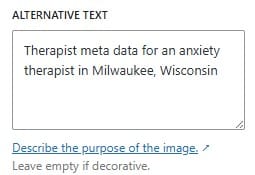
Image Optimization
- Use descriptive file names (e.g., “child-therapist-houston.jpg”)
- Always add ALT text that properly describes the image, unless it’s only decorative, in which case you can leave it blank. This helps search crawlers and people using screen readers to understand what the image represents.
Header Tags (H1, H2, H3)
- Use one H1 per page (usually the title)
- Break content into sections using H2s and H3s for structure and readability
6. Avoiding Common Keyword Research Mistakes
Keyword Stuffing Overusing keywords hurts readability and your ranking. Use them naturally within context.
Ignoring Search Intent If you’re targeting “grief therapy” but the page is about “trauma therapy,” Google will penalize it for mismatching content.
Overly Broad Keywords Terms like “therapy” or “mental health” are too competitive and vague. Localize and specialize.
Neglecting Mobile Optimization A large portion of therapy-related searches happen on mobile. Make sure your site loads fast and is mobile-responsive.
Not Updating Content SEO is not set-it-and-forget-it. Periodically update your content with better-performing keywords or newer terms.
7. Monitoring Keyword Performance and Adjusting Your Strategy
Use these tools to track how well your keywords perform:
Google Analytics
- Monitor traffic, bounce rate, and average time on page
Google Search Console
- See what queries you’re ranking for and your click-through rates
Ubersuggest / SEMRush / Ahrefs
- Use these to track rankings and competitor keyword performance
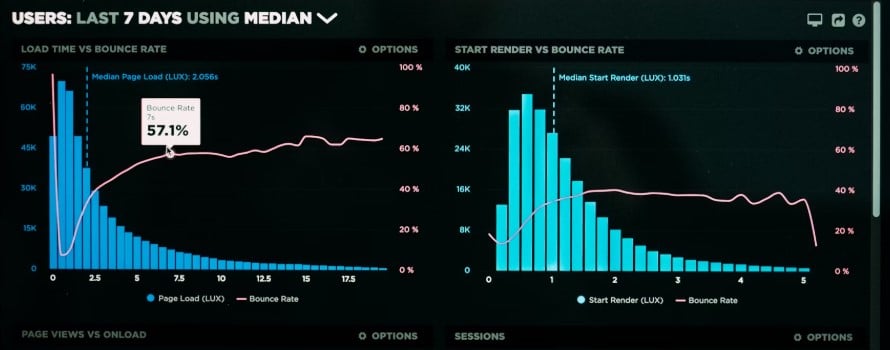
Update Based on Performance
- Low CTR? Tweak your meta title or description.
- Low traffic? Consider more niche long-tail keywords.
- High-performing pages? Add internal links and build on those topics.
Keyword Strategy as the Foundation of Therapist SEO
Keyword research is not just about rankings—it’s about being found by the people who need your help the most. By identifying the right local keywords and integrating them strategically into your website, you’ll boost your visibility, attract more qualified leads, and grow your practice in a sustainable way.
If you’re just starting, focus on long-tail keywords, write helpful content that answers real questions, and monitor your performance consistently. With the right foundation, your keyword strategy will power every other aspect of your SEO.
Need help building your keyword list or implementing it into your site? Contact us today for a free consultation and our team will help set you on a successful path.
